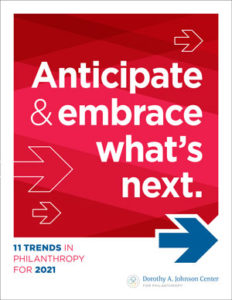The Nonprofit Sector Has a Unique Opportunity to Build Public Trust


 Around the world, “a Great Trust Crisis — a tinderbox of disaffection that could erupt with unpredictable consequences,” is brewing, Foreign Policy’s Indranil Ghosh wrote in January 2020 (para. 10). That was before a global pandemic and international movement for Black Lives Matter rocked the United States and the world.
Around the world, “a Great Trust Crisis — a tinderbox of disaffection that could erupt with unpredictable consequences,” is brewing, Foreign Policy’s Indranil Ghosh wrote in January 2020 (para. 10). That was before a global pandemic and international movement for Black Lives Matter rocked the United States and the world.
Ghosh’s reporting was grounded in the 2020 Edelman Trust Barometer, an annual survey of 28 countries that assesses global public trust in institutions. According to Edelman, trust in nongovernmental organizations (NGOs; i.e., nonprofits) has remained steady at 54-56% since 2018, comparable to trust in business at 53–56% and well above the 44–47% who trust government and media (2019, p. 5). A 2020 study from the BBB Wise Giving Alliance Give.org came to the same conclusion: U.S. adults trust charities more than they trust other institutions, although only 17% said they have “high trust” in nonprofits (Castro, Chng-Castor, Pessanha, Vázquez-D’Amico, & Weiner).
Edelman (2020) notes that, “People today grant their trust based on two distinct attributes: competence (delivering on promises) and ethical behavior (doing the right thing and working to improve society” para. 8). This year, none of the four institutions examined in this survey — government, business, NGOs, and media — were seen as both competent and ethical. While the nonprofit sector performed best in terms of ethics (62% of respondents see NGOs as ethical, versus 48% for business and 31% for government), less than half (46%) see NGOs as competent (Edelman, 2020).
It seems that we trust nonprofits more than other institutions mainly because of perceived ethics, but trust is more fragile and uncertain than people in the sector would like. We know that other trends related to ethical concerns about the sector are taking a significant toll on public trust, — i.e., increasing critiques of “big” donors and nationally recognizable foundations (Moody and Martin, 2020), a rise in public awareness and skepticism about “tainted” donors and dollars (Moody and Pratt, 2020), and the role of megadonors in shaping government and philanthropic policies.
“The nonprofit sector…is uniquely positioned to be a leader in rebuilding public trust in institutions by supporting and leading broad-based community responses to [COVID-19], fighting systemic racism, and addressing the host of challenges we face as a society.”
Still, there are some promising data when it comes to philanthropy’s response to the coronavirus crisis. Survey results published in the Chronicle of Philanthropy showed that, by mid-May, trust in nonprofits’ response to the coronavirus had risen to 70%, up from 66% in April (Theis, 2020a). The greatest gains were seen among Americans age 45–54: respondents saying they had a “fair amount” or “great deal” of confidence in nonprofits’ response to the coronavirus rose from 60% in April to 74% in May (Theis, 2020b).
Yet 2020’s crises are not likely to upend the current trends of declining public trust unless institutions decide to make, and stick to, real changes in how they operate. And this includes nonprofit and philanthropic institutions. The Edelman report (2020) tells us that growing distrust in all institutions is based largely on increasing income inequality and the widespread belief that institutions are focused on serving only the good of the few, rather than the good of all. If we want public trust in the nonprofit sector to grow and to last, institutions in the sector need to take heed of this and other indicators of the causes of declining trust. We need to become better at the things we do, and better at communicating about those things.
Here are a few ways philanthropy is currently tackling this task, or could in the future:
These practices promote trust, both within the sector and of the sector. They not only help the public see how nonprofits and foundations are trying to remedy the issues of most concern to the public, but they move nonprofits and foundations to trust what they hear from communities about their greatest priorities. They encourage funders to trust that nonprofits will put their dollars to effective use, and nonprofits to trust that funders can be genuine partners rather than managers.
It is hard to predict which way the trend of public trust in the nonprofit sector will go in 2021 and beyond, given the rapid pace and, at times, overwhelming scale of change in our world. COVID-19, ongoing social unrest, a new presidential administration — all have a huge potential to impact the direction of public trust and to encourage or discourage more cross-sector partnerships that could boost our collective efficacy.
The nonprofit sector, however, is uniquely positioned to be a leader in rebuilding public trust in institutions by supporting and leading broad-based community responses to the virus, fighting systemic racism, and addressing the host of challenges we face as a society. This is a communications and systems change challenge for the sector: to demonstrate how nonprofits are leading the charge, to remind people how much of the economy (about 12.5 million jobs [Salamon and Newhouse, 2020]) and pandemic emergency response (e.g., hospitals, education, and social services) is grounded in nonprofits, and to capitalize on this work to tell a story of competence and ethics.
Behrens, T., & Martin, T. (2020, February 18). Alternatives to strategic philanthropy are emerging. 11 trends in philanthropy for 2020. Dorothy A. Johnson Center for Philanthropy. https://johnsoncenter.org/blog/alternatives-to-strategic-philanthropy-are-emerging/
Castro, E., Chng-Castor, A., Pessanha, R., Vázquez-D’Amico, E., & Weiner, B. (2020). Donor trust report 2020: The pandemic and a three-year retrospective. BBB Wise Giving Alliance. https://www.give.org/docs/default-source/donor-trust-library/2020-donor-trust-report.pdf
Daniels, A. (2020, August 5). Private foundation pledges top $1 billion for racial justice. Chronicle of Philanthropy. https://www.philanthropy.com/article/Private-Foundation-Pledges-Top/249259
Edelman Data & Intelligence. (2020, January 19). 2020 Edelman trust barometer. Edelman. https://www.edelman.com/trustbarometer
Edelman. (2019). 2019 Edelman trust barometer: Global report. Author. https://www.edelman.com/sites/g/files/aatuss191/files/2019-02/2019_Edelman_Trust_Barometer_Global_Report.pdf
Ghosh, I. (2020, January 22). The global trust crisis. Foreign Policy. https://foreignpolicy.com/2020/01/22/davos-world-leader-trust-institutions-populism-protest
Hopkins, B. (2020, May 6). Don’t tie the hands of DAFs, the best option for aid in the Covid economy. Chronicle of Philanthropy. https://www.philanthropy.com/article/dont-tie-the-hands-of-dafs-the-best-option-for-aid-in-the-covid-economy
Iyengar, R. (2020, April 7). Jack Dorsey sets aside $1 billion for charity. His initial focus: coronavirus relief efforts. CNN Business. https://www.cnn.com/2020/04/07/tech/jack-dorsey-coronavirus-donation/index.html
Jacobs, J. (2020, August 5). Met shrinks staff again, totaling 20 percent cut. The New York Times. https://www.nytimes.com/2020/08/05/arts/design/met-museum-layoffs-pandemic.html
Martin, T., & Moody, M. (2020, November 17). Increasing critiques of (big) philanthropy. 11 trends in philanthropy for 2020. Dorothy A. Johnson Center for Philanthropy. https://johnsoncenter.org/blog/increasing-critiques-of-big-philanthropy/
Moody, M., & Pratt, M. (2020, December 22). Tainted money and tainted donors: A growing crisis? 11 trends in philanthropy for 2020. Dorothy A. Johnson Center for Philanthropy. https://johnsoncenter.org/blog/tainted-money-and-tainted-donors-a-growing-crisis/
Salamon, L. M., & Newhouse, C. L. (2020, June). The 2020 nonprofit employment report. Nonprofit Economic Bulletin no. 48. Johns Hopkins Center for Civil Society Studies. http://ccss.jhu.edu/wp-content/uploads/downloads/2020/06/2020-Nonprofit-Employment-Report_FINAL_6.2020.pdf
Theis, M. (2020a, April 29). Americans giving more to health causes since the pandemic and cutting back on environment and education. Chronicle of Philanthropy. https://www.philanthropy.com/article/americans-giving-more-to-health-causes-since-the-pandemic-and-cutting-back-on-environment-and-education
Theis, M. (2020b, June 4), Trust in nonprofits rises as confidence in government Covid response slides. Chronicle of Philanthropy. https://www.philanthropy.com/article/trust-in-nonprofits-rises-as-confidence-in-government-covid-response-slides